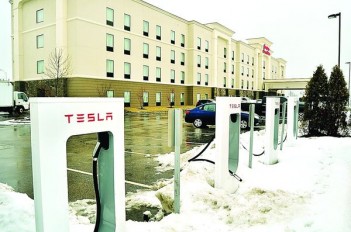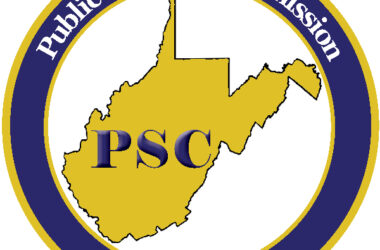
A Tesla electric vehicle supercharging station is located at the Hampton Inn in Wheeling.
PARKERSBURG, W.Va. — An American maker of innovative electric cars and traditional dealers with brick and mortar stores have a different opinion of a bill pending in the West Virginia Senate.
The bill is anti-competitive, limits consumer choice and protects an “antiquated and monopolistic business model,” said Will Nicholas, a spokesman for Tesla Motors. Tesla sells directly to consumers who don’t go through a dealer and would be prevented from selling in West Virginia, Nicholas said.
“It’s protectionism at best,” Nicholas said.
However, Ruth Lemmon, president of the West Virginia Automobile and Truck Dealers Association, said the bill puts sellers on equal footing and is aimed at consumer protection.
“It makes sure everybody is playing from the same playbook,” she said.
The bill, which was on second reading Tuesday, amends West Virginia Code sections relating to motor vehicle dealers, distributors and manufacturers.
The lead sponsor is Sen. Mike Woelfel, D-Cabell. A message left for Woelfel was not immediately returned. Senate President Bill Cole, R-Mercer, a car dealer, referred questions to Woelfel.
Sen. Dave Nohe, R-Wood, is among the sponsors. According to Nohe, among the key points in the bill are language clarifications, protections for customer information between dealers and manufacturers and a requirement for disputes between manufacturers and dealers to be heard in a West Virginia court.
Tesla’s current business model does not comply with state law, Nohe said. It can meet the requirements of the law and would not be precluded from opening a franchise, he said.
The bill “is an attempt by the dealer association to strengthen their position against their franchisors, and in addition, limits new manufacturers without franchises to sell directly to consumers,” Nicholas said. “Meaning that anyone new to the business must do it through their franchises.”
The company has made 37,000 cars, Nicholas said, adding one car was sold in the Parkersburg area.
Tesla, according to its website, has charging stations at The Greenbrier at White Sulphur Springs and a supercharger at the Hampton Inn in Wheeling. Tesla plans to invest in at least four more fast-charging sites at Beckley, Charleston, Morgantown and Sutton or Weston, Nicholas said.
Four states already prevent Tesla sales, including New Jersey, Michigan, Texas and Arizona, Nicholas said. He expects the bill to pass in West Virginia.
Lemmon, however, said the bill levels the playing field and protects consumers if the manufacturer ceases business or pulls out of the state.
Dealers with a physical presence support the community and pay local taxes and employ local workers, Lemmon said. Companies such as Tesla without a brick and mortar presence do not.
“We want everybody to be on equal footing,” said Dan Wharton Sr., a Parkersburg auto dealer.
The heart of the issue is consumer protection, Wharton said.
With a dealer, the buyer has access to repairs in a timely manner and a place to take the vehicle for warranty work, Wharton said. Moreover, a buyer can compare offers between dealers to negotiate a price for the vehicle, Wharton said.
“With Tesla, it doesn’t work that way,” he said.
To read more from the Parkersburg News and Sentinel, subscribe here.






